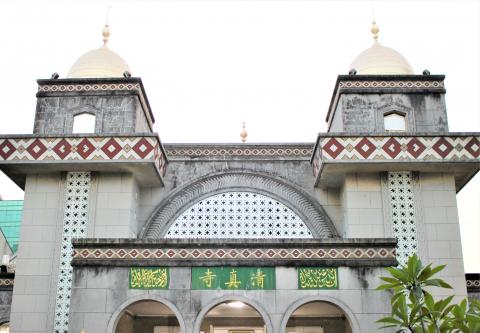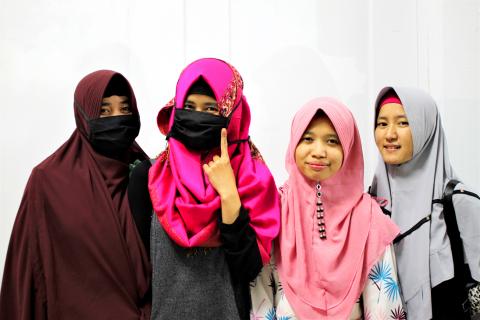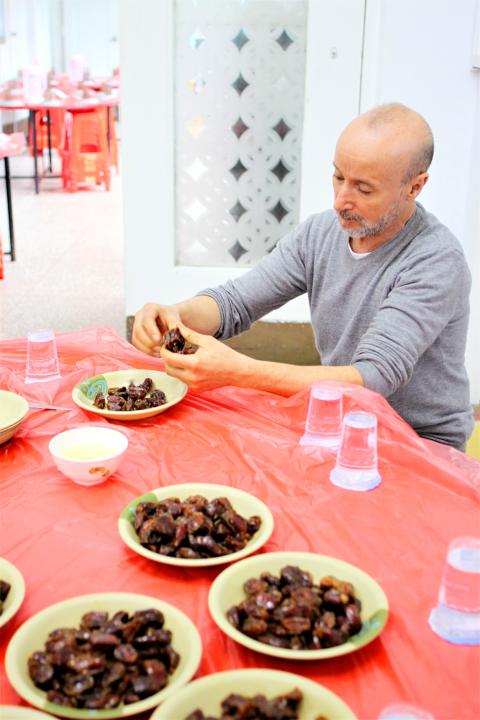When Zaharah Chen (陳俞如) converted to Islam in the summer of 2013, it was a momentous decision that she intended to honor in all aspects of her life. But when she wore a headscarf to work the next day, the sight shocked her employer, who at first thought that Chen was dressing up for cosplay.
After being informed of its religious significance, “he said, ‘You’ve become a Muslim? Do you know that Islam is a terrorist religion? Why would you join a religion like that?’” Chen recounts.
Chen was dismissed later that day on the grounds that her work was unsatisfactory. She decided not to dispute the firing so as not to put her long-time employer in a difficult position. But the experience was dispiriting.

Photo: Davina Tham, Taipei Times
“I felt very sad. Why would you negate a person because of her religious beliefs, especially when what you think about her religion is not correct at all?” she tells the Taipei Times.
In a society where ignorance and insensitivity toward Islam are still common, Taipei’s Grand Mosque has become a sanctuary where Chen and other Muslims find community and understanding, especially during the holy month of Ramadan.
THE GRAND MOSQUE

Photo: Davina Tham, Taipei Times
Chen is a lifelong native of Taipei. But on the day of her conversion at the Grand Mosque, she, like many locals, found herself in a part of the city she had never set foot in before.
The Grand Mosque, with its full green dome and two minarets, has been part of the cityscape since 1960. It is the largest of eight mosques in Taiwan. Chairperson Feng Tung-yu (馮同瑜) estimates that 2,000 people pass through the mosque’s doors each week.
Attendance peaks during Ramadan, which falls between May 6 and June 4 this year. From sunrise to sunset, Muslims who are physically able are required to abstain from all food and drink.

Photo: Davina Tham, Taipei Times
Following Islamic custom, the Grand Mosque provides complimentary iftar — a communal evening meal to break fast — throughout Ramadan. Donations from the congregation, ranging from NT$30,000 to NT$50,000, cover the cost of each meal. On the day that I visit, a group of Pakistani volunteers are preparing curries, salad, rice and flatbread.
During the holy month, Juniata, an Indonesian domestic helper working in Hsinchu County, makes a special weekend trip to the Grand Mosque for prayers and iftar.
When I meet her, Juniata is huddled together with other young Indonesian women, all of whom she has just met earlier that day during prayers. The women chitchat among themselves in their mother tongue, but switch to a colloquial Chinese outside of their group.

Photo: Davina Tham, Taipei
The iftar mainly draws people from low to middle-income brackets, migrant workers and exchange students. All of this makes for a strikingly international congregation, where strangers of myriad ethnicities sit shoulder-to-shoulder at the dining table.
But not everyone is there for God alone, nor even for the free meal. The prospect of being in a space where Muslims are the majority, moving freely among fellow worshipers, can be a salve to the daily stress of living as a minority.
BRIDGING THE GAP
Juniata and Shofia, another domestic worker, consider themselves fortunate because their employers respect their right to practice their religion.
Both women fast during Ramadan, wear headscarves at work and sometimes cook and store their own halal meals in their employers’ kitchens.
When I ask if fasting makes it hard to carry out physically-demanding tasks, Juniata replies that it’s no more difficult than usual.
“Our bosses are very good,” she says. “But there are some bad ones, too.”
Shofia recalls an uncomfortable experience with her employers’ friends, who questioned why she wore a headscarf, long-sleeved shirt and long pants even in the heat of summer.
“They might think it is strange to cover up their own hair,” Shofia says, frowning. But on the contrary, “if I don’t cover up my hair, then I feel strange.”
Chen, who has studied Islam in Malaysia and the United Arab Emirates, says that even she at first avoided Islam when embarking on the religious exploration that eventually led to her conversion.
Among most Taiwanese “there is no clear understanding of Islam, only certain messages conveyed by the media,” Chen says. Initially, she too was put off by stereotypes that associate Islam with terrorism and the Sept. 11, 2001 attacks in the US.
Partly to combat ignorance about Islam, and partly because of the secular environment in which it operates, the Grand Mosque makes an effort to keep its doors open to non-believers. Women whose heads are uncovered are not turned away. Worshipers offer food and greetings to visitors, regardless of their religion.
“We are more easygoing with non-Muslims, because we also hope that they can understand Islam,” Feng says. “If you have too many restrictions and you tie their hands, they won’t come. Then with time as they grow distant, they will become estranged.”
Despite Chen’s bitter experience with her former employer, she too believes that understanding is possible with time and patience.
Chen’s parents also questioned their daughter’s decision to convert, asking why she was joining a religion that they felt was oppressive toward women. She made an effort to explain what Islam meant to her and clarify their misconceptions.
Six years on, Chen says that her parents have now grasped and even agree with the basic precepts of Islam, like why Muslim women cover themselves up. Both generations have reached an understanding, even as Chen’s parents continue to practice folk traditions, like ancestral worship.
And when faced with questions from the ignorant or skeptical, she has gained an unexpected ally.
Now an employee of the Chinese Muslim Association (中國回教協會), Chen once found herself engaging visitors at the annual Taipei Eid al-Fitr and Muslim Festival. Curious passersby asked her about the Muslim attire, dietary restrictions and other practices they find exotic.
Chen’s mother happened to be there that day, and spoke up.
“Sometimes even she will help me to explain why I don’t eat pork and why I am dressed like this,” Chen says.

On April 26, The Lancet published a letter from two doctors at Taichung-based China Medical University Hospital (CMUH) warning that “Taiwan’s Health Care System is on the Brink of Collapse.” The authors said that “Years of policy inaction and mismanagement of resources have led to the National Health Insurance system operating under unsustainable conditions.” The pushback was immediate. Errors in the paper were quickly identified and publicized, to discredit the authors (the hospital apologized). CNA reported that CMUH said the letter described Taiwan in 2021 as having 62 nurses per 10,000 people, when the correct number was 78 nurses per 10,000

As we live longer, our risk of cognitive impairment is increasing. How can we delay the onset of symptoms? Do we have to give up every indulgence or can small changes make a difference? We asked neurologists for tips on how to keep our brains healthy for life. TAKE CARE OF YOUR HEALTH “All of the sensible things that apply to bodily health apply to brain health,” says Suzanne O’Sullivan, a consultant in neurology at the National Hospital for Neurology and Neurosurgery in London, and the author of The Age of Diagnosis. “When you’re 20, you can get away with absolute

May 5 to May 11 What started out as friction between Taiwanese students at Taichung First High School and a Japanese head cook escalated dramatically over the first two weeks of May 1927. It began on April 30 when the cook’s wife knew that lotus starch used in that night’s dinner had rat feces in it, but failed to inform staff until the meal was already prepared. The students believed that her silence was intentional, and filed a complaint. The school’s Japanese administrators sided with the cook’s family, dismissing the students as troublemakers and clamping down on their freedoms — with

As Donald Trump’s executive order in March led to the shuttering of Voice of America (VOA) — the global broadcaster whose roots date back to the fight against Nazi propaganda — he quickly attracted support from figures not used to aligning themselves with any US administration. Trump had ordered the US Agency for Global Media, the federal agency that funds VOA and other groups promoting independent journalism overseas, to be “eliminated to the maximum extent consistent with applicable law.” The decision suddenly halted programming in 49 languages to more than 425 million people. In Moscow, Margarita Simonyan, the hardline editor-in-chief of the